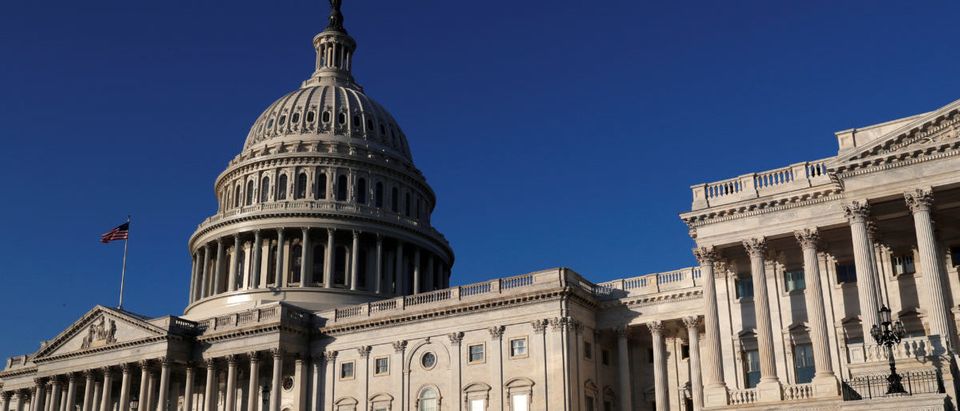There’s something to be said about old-fashioned legwork, firm handshakes and direct conversations with members of Congress. Just one week after more than 55 firearms and ammunition industry executives came together on Capitol Hill to meet with senators and representatives, the effort is paying off.
The National Shooting Sports Foundation held its’ annual Congressional Fly-In April 10-11, holding meetings with more than 70 lawmakers in the U.S. Senate and House of Representatives from both political parties. Those industry leaders represented manufacturers, distributors, range owners, retailers and publishers from 25 states. Their goal was to remind lawmakers of the economic contributions the industry makes to their states and Congressional districts and highlight barriers they face in growing their businesses.
Industry’s Legislative Priorities
NSSF presented several pieces of pending legislation and regulations, including Export Control Reform, The Federal Firearms Licensee Protection Act, the Target Practice and Marksmanship Training Support Act, the Constitutional Concealed Carry Reciprocity Act, and Age-Based Gun Bans being proposed in several states and in Congress.
One week later, three of those issues are already seeing significant progress.
Export Control Reform
The same day industry leaders were discussing Export Control Reform, The White House cleared the parallel proposed rules from the State Department’s Directorate of Defense Trade Controls (DDTC) and the Commerce Department’s Bureau of Industry and Security (BIS) to transfer commercial firearms and related ammunition from U.S. Munitions List (USML) Categories I, II and III (firearms and ammunition) to Commerce Control List.
Now that the rules have cleared, we expect to see the publication within two to six weeks. There are several more hurdles to overcome, but this development is a crucial milestone to allowing U.S. manufacturers to compete on a more even playing field with international manufacturers. It will also eliminate fees for hobbyist gunsmiths who only repair firearms, but not make them for sale or export.
Target Practice and Marksmanship Training Support Act
In less than a week, H.R. 788, the Target Practice and Marksmanship Training Support Act was passed out of the U.S. House of Representatives Natural Resources Committee with a bipartisan unanimous vote. House Natural Resources Committee Chairman Rob Bishop (R-Utah) said in a press statement, the legislation is a “win-win for hunters, sportsmen and wildlife restoration.”
The legislation will allow states more flexibility in using Pittman-Robertson excise tax funds to develop and maintain public shooting ranges. The excise tax is paid by firearms and ammunition manufacturers, which is supported by the gun owners who buy the products. Increased funding for public ranges will increase access and allow more people to participate in the shooting sports, which will perpetuate Pittman-Robertson funds for future projects and wildlife conservation. The bill will next head to the House floor for a vote by the full body.
Federal Firearms Licensee Protection Act
H.R. 3790, the Federal Firearms Licensee Protection Act, picked up five additional cosponsors. Along with the Senate companion, S. 1854, the legislation would strengthen criminal penalties for the theft of firearms from firearms retailers and impose mandatory minimum sentences.
Concealed Carry Reciprocity
Senate Majority Whip John Cornyn (R-Texas) spoke to industry leaders after he was presented with the NSSF 2017 Legislator of the Year Award. He noted that while there was a milestone in passing the Fix NICS Act, he remained committed to pursuing Senate passage of S. 446, the Constitutional Concealed Carry Reciprocity Act, which he sponsored. It currently has 39 cosponsors. Similar legislation, H.R. 38, passed the House last December.
Economic Impact
Industry leaders had good news for members of Congress who appreciate the economic contribution of the industry explaining it has grown 169 percent since 2008, contributing $51.4 billion in economic activity, supporting 311,000 jobs, and paying more than $6.7 billion in Federal and state taxes and another $717 million in excise taxes last year alone. Congress is responding by taking the industry’s concerns and turning that into legislative action.
None of this is possible without an engaged and committed industry that comes together to meet with their elected leaders. The work isn’t done. The NSSF staff remains on Capitol Hill working to further the industry’s priorities. You can still do you part by taking your elected leaders to work.
Together, we have demonstrated the strength of our industry and what can happen when we work together to advance our agenda.
Larry Keane is Senior Vice President and General Counsel for the National Shooting Sports Foundation.


